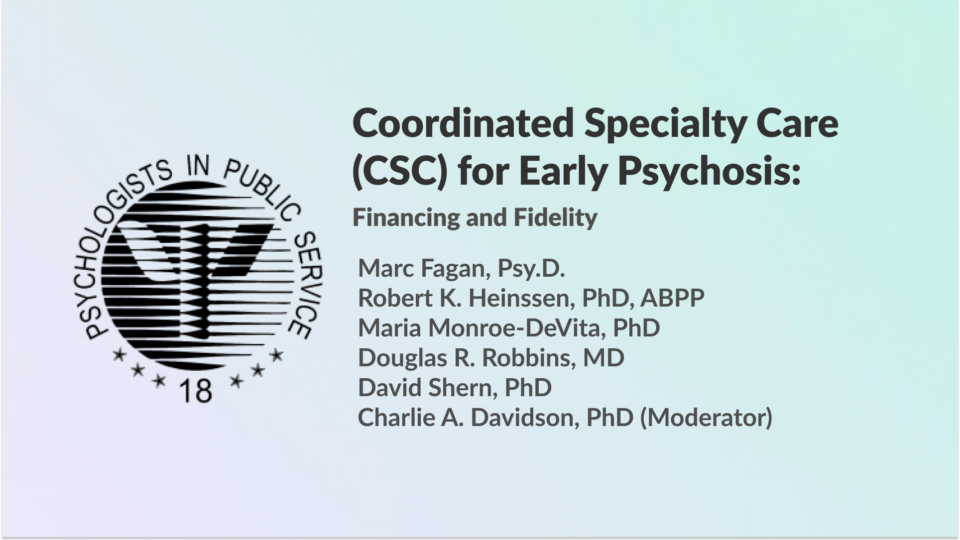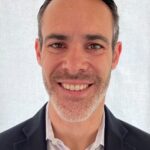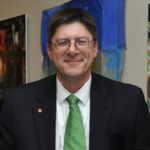
Coordinated Specialty Care (CSC) for Early Psychosis:: Financing and Fidelity
Information
Recorded
-
-
Brought to you by
Learning Objectives
Participants will be able to:
-
Identify at least one barrier to appropriately funding the evidence-based practice of Coordinated Specialty Care (CSC).
-
Describe the difference between the team-based HCPCS billing code and typical fee-for-service billing approaches.
-
Name at least one barrier to fidelity in CSC implementation.
-
Identify at least one way in which psychologists can contribute professionally and/or as advocates for CSC and the people it serves.
Educational Goal
The educational goal of this workshop is to increase knowledge about CSC financing and fidelity.
Description
In this workshop, the panelists will discuss recent changes in policy and financing strategies as well as future directions for Coordinated Specialty Care (CSC) for First Episode Psychosis (FEP). We will also review the evidence base for CSC and discuss how it is being implemented. This workshop will cover fidelity and the impact assessed in different contexts.
Target Audience
- Counselor
- Marriage & Family Therapist
- Psychologist
- Social Worker
- Substance Use Disorder Professionals
Presenters


David Shern, PhD has over 40 years of experience working in public behavioral health systems in Colorado, New York and Florida. He conducted mental health services research for most of his career focusing principally on the organization and financing of services for persons with severe mental illnesses. In 2006 he left his position as Professor and Dean at the Florida Mental Health Institute to become President/CEO of Mental Health America helping to pass the Mental Health Parity and Addictions Equity Act and the Affordable Care Act. He joined NASMHPD in 2012 where he has focused exclusively on prevention and early intervention programming. With colleagues he has developed a portfolio of TA products focused on all aspects of Coordinated Specialty Care (CSC) including materials for clinicians, policy makers, families, primary consumers and related fields such as criminal justice and education. He has represented NASMHPD on the PEPPNET TTA workgroup that convenes all the major national purveyors of CSC. For the last 3 years he has chaired the PEPPNET financing workgroup which has focused on developing sustainable, insurance-based coverage for CSC services. Most recently, Dr. Shern prepared an application to the Centers for Medicare and Medicaid services seeking a billing code for CSC services. He currently co-chairs the Dissemination function of the NIMH sponsored Early Psychosis Intervention Network.

Charlie A. Davidson, PhD is a licensed clinical psychologist in Atlanta. He currently runs a private practice focusing on SMI and psychosis and also works at a nonprofit medical clinic for uninsured and unhoused
people in the city. He is also an adjunct professor at Emory University. Charlie is involved in advocacy for
people with SMI and psychosis, for their families and supporters, and for SMI psychology.

Marc Fagan, Psy.D is the Plan President for YouthCare, a line of business under Centene. YouthCare provides all Medicaid Health Insurance to Youth in Illinois Foster Care and youth who were formerly in Foster Care. Dr. Fagan has his roots in overseeing comprehensive programs for young adults with serious mental health needs and histories of complex trauma, including Illinois’ first and largest Coordinated Specialty Care programs for First Episode Psychosis. These programs have been described in numerous scholarly journals, books, and research studies. Dr. Fagan also facilitates interactive workshops nationally regarding evidence-informed practices for Transition-Age Youth and supports numerous workgroups and research dedicated to improving youth outcomes.

Robert K. Heinssen, Ph.D., ABPP is Senior Advisor for learning health care research at the National Institute of Mental Health (NIMH) and past Director of the NIMH Division of Services and Intervention Research. He is recognized internationally as a leader in science-to-practice initiatives in serious mental illness, including translational research in psychosis risk states, comparative effectiveness and implementation trials in first episode psychosis, and suicide prevention in military and civilian settings. His clinical and policy research contributions have facilitated rapid and substantial growth of science-based early intervention services across the United States. He is the principal architect of the nation’s first learning health care system for persons with serious mental illness, the Early Psychosis Intervention Network (EPINET). Dr. Heinssen has received several prestigious awards, including recognition from the International Early Psychosis Association; the National Alliance on Mental Illness (NAMI); the International Society for CNS Clinical Trials and Methodology; and the U.S. Department of Health and Human Services. He is a graduate of the Catholic University of America and completed internship and residency training at McLean Hospital/Harvard Medical School and Chestnut Lodge Hospital, respectively. Dr. Heinssen is a board-certified clinical psychologist, a Fellow of the American Academy of Clinical Psychology, and a veteran of the U.S. Army Medical Services Corps.

Maria Monroe-DeVita, PhD is an Associate Professor in the Department of Psychiatry and Behavioral
Sciences at the University of Washington School of Medicine and a clinical psychologist by training. She has over 20 years of experience training and conducting mental health services and implementation research on evidence-based practices for people who experience psychosis and other serious mental illnesses, including team-based care models like assertive community treatment (ACT) and coordinated specialty care for first episode psychosis.
Dr. Monroe-DeVita leads the training and implementation of 17 New Journeys CSC programs in Washington State. She is also developing a Family Bridger model, focused on providing support, skills, and resources to families of individuals with early psychosis during hospitalization and transition to the community.
